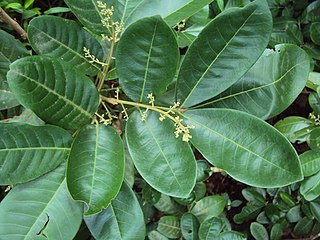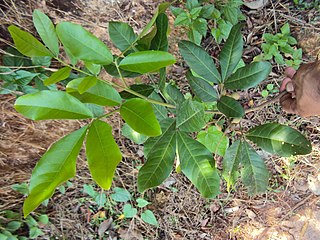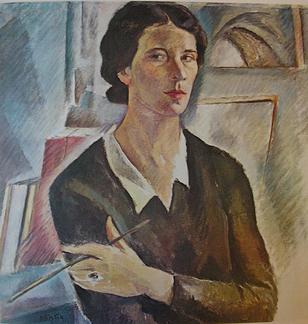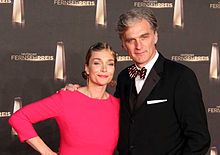
In Greek mythology, Aglaea or Aglaia is a goddess, one of the Graces (Charites), also called the Gratiae in Roman mythology.

Aglaia is a genus of 121 recognised species of woody dioecious trees in the mahogany family Meliaceae. They occur in the subtropical and tropical forests of Southeast Asia, northern Australia and the Pacific.

Four for Venice is a 1998 comedy film directed by Vivian Naefe.
Austria-Forum is a freely accessible online collection of reference works on Austria in German, with some articles in English, initiated by TU Graz. As of 2022, Austria-Forum has been integrated with NID-Library.

Aglaia elaeagnoidea, the droopy leaf or priyangu, is a species of plant in the family Meliaceae. It is a 10m tall tree found in American Samoa, Australia, Cambodia, China, India, Indonesia, Malaysia, New Caledonia, Papua New Guinea, the Philippines, Samoa, Sri Lanka, Taiwan, Thailand, Vanuatu, and Vietnam.

Aglaia rimosa is an evergreen small tree in the family Meliaceae. It is found in Indonesia, Papua New Guinea, the Philippines, and Taiwan. Aglaia rimosa "grows primarily in the wet tropical biome".The official name of Aglaia rimosa in Taiwan is Large-leaved aglaia, because compared with the other two species native to Taiwan, Aglaia elaeagnoidea and Aglaias chittagonga, the leaflet of Aglaia rimosa is larger than their leaflet, all three are imparipinnate.The flowers of Aglaia rimosa have fragrance, but it is lighter than that of Aglaia odorata.The anticancer compound Rocaglamide (RocA) was originally extracted from Aglaia rimosa by researchers in Taiwan.
Philophrosyne was the feminine personification of goodness, friendship, and reception. Their sisters were Eucleia, Eupheme, and Euthenia. Along with her sisters, she was a member of the younger Charites. According to the Orphic fragments, Philophrosyne was the daughter of Hephaestus and Aglaia. Some authors divide to Philophrosyne into two separate goddesses called Euphilo ("Goodness") and Euphrosyne ("Friendship"), in this minority version both goddesses are daughters of Hephaestus and Aglaia.
In Orphic literature, Eupheme was one of the daughters of Hephaestus and Aglaia, alongside Eucleia, Euthenia, and Philophrosyne.

Klimt is a 2006 Austrian art-house biographical film about the life of the Austrian Symbolist painter Gustav Klimt (1862–1918). It was written and directed by Chilean filmmaker Raúl Ruiz, with an English screenplay adaptation by Gilbert Adair. The director of photography was Ricardo Aronovich, and the music was composed by Jorge Arriagada. The title role is played by John Malkovich and the cast includes Stephen Dillane. Both a 130-minute-long director's cut and a shortened producer's cut of 96 minutes were shown at the 2006 Berlin Film Festival. A few months later the film was shown at the 28th Moscow International Film Festival where it was nominated for two awards, winning the Russian Film Clubs Federation Award.
Szyszkowitz + Kowalski is an Austrian-German architectural design team made up of Karla Kowalski and Michael Szyszkowitz. Their studio in Graz was established in 1978. Szyszkowitz + Kowalski are regarded to be major co-founders of the internationally renowned Grazer Schule. Originating in Graz in the 1970s, this name stands for architectural individualism of an especially creative type. Szyszkowitz + Kowalski put great emphasis on three-dimensional and expressive architectural language with a distinctive reference to landscape and context.

Aglaia Coronio was a British embroiderer, bookbinder, art collector and patron of the arts.

Almanya: Welcome to Germany is a 2011 German comedy-drama film directed by Yasemin Şamdereli. The film premiered at the 61st Berlin International Film Festival in the section competition and won the Deutscher Filmpreis 2011 in the categories Best Script and Best Film.
Alio Die, the stage name of Stefano Musso, is an Italian ambient-music composer and producer. Stefano Musso studied art and electronics in Milan, Italy, and began performing music in 1989.
Aglaia is a feminine given name that comes from the ancient Greek Grace Aglaia (Ἀγλαΐα). It may also be written Aglaïa or sometimes as Aglaja, Aglaya, or Aglaea.
Rommel is a 2012 German television film first shown on Das Erste. It is a dramatisation of the last days of German general Erwin Rommel.

Aglaia Papa was a Greek painter.
Aglaia Mafalda Pezzato is an Italian swimmer.

Origin is an American science fiction drama series created by Mika Watkins that premiered on November 14, 2018, on YouTube Premium. Watkins also serves as a writer for the series and executive produces alongside Andy Harries, Rob Bullock, Suzanne Mackie, Josh Appelbaum, André Nemec, Jeff Pinkner, and Scott Rosenberg. On March 25, 2019, YouTube cancelled the series after one season.
Everything Will Be Fine is a German comedy film written by Angelina Maccarone and Fatima El-Tayeb, released in 1998. Everything Will Be Fine was the first German film since Toxi with a Black German female protagonist. Additionally, it was the first German comedy with a non-white protagonist. The film aired on German TV and brought novelty to German film through its use of comedy to highlight racism. Maccarone drew from screwball comedy of the 1930s and took it back, made it witty, and “queered” it. Additionally, Everything Will Be Fine moved away from a “problem film”, one that accentuates strangeness, to a film that highlights black female protagonists who are self-sufficient and free. The film highlights different ways of being Black, Queer, and German, The black characters were not depicted as strangers or problems for the German nation through Maccarone's ability to show the “everydayness” of black Germans. This is in stark contrast to Toxi, a 1952 German film, that highlights Toxi, a young black German girl, as a problem.
Tessa Szyszkowitz is an Austrian historian, journalist and author.










